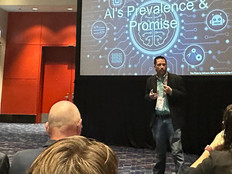Carnegie Mellon University Wants Data on Education Technology
Technology helps students learn, right?
We think so, but Carnegie Mellon University wants data to prove it. They recently announced the Simon Initiative, which will be the “world’s largest database on student learning … in an effort to identify best practices and standards for using technology in the classroom,” reports Inside Higher Ed.
The initiative is named in memory of Herbert A. Simon, the prolific Carnegie Mellon scholar who was awarded the Nobel Memorial Prize in Economic Sciences in 1978.
Carnegie Mellon President Subra Suresh said the Simon Initiative will build on the work taking place at the Pittsburgh Science of Learning Center -- including research partners such as the Open Learning Initiative -- and the Eberly Center for Teaching Excellence and Educational Innovation.
Looking beyond the initiative's lofty proposals, the announcement outlines four major goals: sharing rich data globally, helping teachers teach, accelerating innovation and scaling through start-up companies -- which Carnegie Mellon has proven adept at -- and improving residential students' educational experience.
It’s clear that technology is helping students learn, but this initiative is designed to prevent educators from leaning too heavily on digital content, online tools and interactive software. The Global Learning Council, a group of experts from education, business and technology who will be a core element of the Simon Initiative, frames the problem in its introduction letter:
Learning scientists, technology providers and university leaders around the world are pursuing the promise of what such technology is making possible, while asking important questions about the nature of learning, and the role of new technology in learning, the answers to which will continue to improve both technology and teaching methodologies.
But these questions cannot be answered by one institution, company or nation alone. While much has already been gained from collective educational partnerships, the scope needs to be significantly broader.
The Council will feature names from some of the world’s most prestigious colleges and key players from top technology companies. Here’s the full list:
- Subra Suresh (Chair), President, Carnegie Mellon University
- Anant Agarwal, President, edX
- Tan Chorh Chuan, President, National University of Singapore; Chair, Global University Leaders Forum for the World Economic Forum
- Anoop Gupta, Distinguished Scientist, Microsoft Research
- Daphne Koller, Co-founder of Coursera
- Alan Leshner, Chief Executive Officer, American Association for the Advancement of Science
- Peter McPherson, President, Association of Public and Land-grant Universities
- Mark Nordenberg, Chancellor, University of Pittsburgh
- Hunter Rawlings, President, Association of American Universities
- Andrew Rosen, Chairman and CEO, Kaplan
- Alfred Spector, Vice President of Research, Google
- Suzanne Walsh, Deputy Director, Postsecondary Success, Bill & Melinda Gates Foundation and member, World Economic Forum, Global Agenda Council on the Future of Universities
- Carl Wieman, Nobel Laureate and Professor of Physics and Education, Stanford University
For more information, visit Carnegie Mellon’s page about the Simon Initiative.







